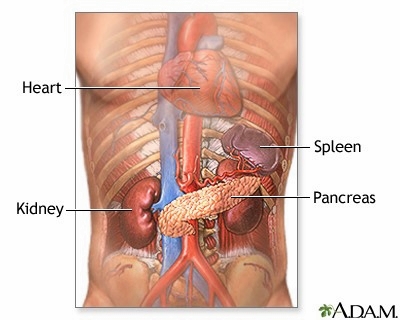Monitoring of Complications
Introduction
Renal profile is a test to assess kidney health. It is useful to measure kidney function. Renal profile gives information on levels of creatinine, sodium, calcium, chloride, blood urea and potassium. Some laboratory calculates glomerular filtration rate too.
Kidney plays an important role in maintaining fluid and electrolyte balance. It retains the required substances and excretes undesired substances in the form of urine. This is to ensure optimum functioning of the body.
Renal profile is a screening tool recommended in high-risk population especially diabetes patients.

Diagram 1 : Anatomy of the kidneys [3]
What is Renal Profile?
Renal profile indicates how well the kidneys are functioning. It is reflected by the parameters mentioned above. Renal profile is a monitoring tool for patients with chronic kidney disease.
Sudden change in renal profile may indicate deterioration in kidney function that needs urgent treatment. Renal profile is also used to monitor kidney health after a transplant.
In diabetes patients, renal profile is recommended to detect diabetic nephropathy (kidney disease). Screening for diabetic nephropathy is done annually [1].
How To Test For Renal Profile?
Renal profile is done by taking a blood sample. It will then processed by an accredited medical laboratory. Patient does not have to fast for this test.
Medical laboratory will provide normal ranges as referral guide. The doctor will interpret the results based on clinical findings.
When To Test For Renal Profile?
Renal profile is tested at least annually for diabetes and hypertensive patients [1,2]. More frequent testing is required when an abnormality is discovered and confirmation needed. Most importantly renal profile is done to monitor the stability of kidney function.
Why Test For Renal Profile?
Diabetic nephropathy is one of the microvascular complications occurring in diabetes patients.
Nephropathy screening is recommended in type 2 diabetes mellitus upon diagnosis [1]. As for type 1 diabetes mellitus, screening is done after five years of diagnosis [2].
Diabetic nephropathy indicates damage to the nephrons. Hyperglycaemia causes thickening to the nephrons which slowly become scarred over time. The kidneys begin to leak and protein (albumin) passes into urine.
Diabetic nephropathy can lead to chronic kidney disease and progresses to end-stage renal failure. Patients will need haemodialysis when the kidney has stopped functioning.

Diagram 2 : Comparison between normal kidney and scarred kidney [3]
Why is Renal Profile Important For Diabetes Patients?
Renal profile is a useful tool to detect diabetic nephropathy in diabetes patients.
Diabetes nephropathy contributes the highest prevalence of end-stage renal disease requiring haemodialysis in Malaysia [6]. Early detection and treatment can retard progression.
Diabetes has now become the most single cause of end-stage renal disease in the US and Europe. Diabetic nephropathy accounts for 40 percent of end-stage renal disease in the US [5].
Risk-Factors For Diabetic Nephropathy
- Diabetes – poorly controlled blood glucose
- Hypertension – poorly controlled blood pressure
- Dyslipidaemia – (high cholesterol and fat content in the blood)
- Obesity
- Certain drugs example NSAIDS (non-steroidal anti-inflammatory drugs) painkillers
Is There Any Treatment For Diabetic Nephropathy
Angiotension Converting Enzyme Inhibitors (ACE Inhibitors) and Angiotension Receptor Blocker (ARB) can retard the progression to end-stage renal failure [4, 5]. They have been shown effective in slowing the diabetic nephropathy progression and is recommended by the American Diabetes Association [5].
Can Diabetic Nephropathy Be Prevented?
Optimal control of blood glucose and achieving target HbA1C is essential [1]. Blood pressure control and targeting to 130 / 80 in diabetes patients is an integral aspect of diabetes management.
Optimal control of blood glucose and blood pressure can prevent the emergence of nephropathy. It will also retard the progression to end-stage renal disease.
Avoidance of noxious drugs such as painkillers e.g. ibuprofen, naproxen and celecoxib is advocated [3]. These drugs may injure the kidney further leading to deterioration of kidney function.
Conclusion
Renal profile is a test for measuring kidney function. It is to detect diabetic nephropathy. Diabetic nephropathy if treated early can slow the progression to end-stage renal failure.
References :
- Malaysian Clinical Practice Guideline on Management of Type 2 Diabetes Mellitus 2009.
- Malaysian Clinical Practice Guideline on Management of Type 2 Chronic Kidney Disease 2011.
- http://www.ncbi.nlm.nih.gov/pubmedhealth/PMH0001524/ – accessed 20th September 2012.
- Edmund J. Lewis et al. The Effect of Angiotension Converting Enzyme Inhibition on Diabetes Nephropathy. N Engl J Medicine 1993; 329: 1456–1462.
- American Diabetes Association. Nephropathy in Diabetes. Diabetes Care 2004; 27 (suppl 1) : 579 – 583.
- Lim YN, Lim TO, Lee DG, Wong HS, Ong LM, Shaariah W, Rozina G, Morad Z.A report of the Malaysian dialysis registry of the National Renal Registry, Malaysia. Med J Malaysia. 2008; 63 (Suppl C): 5-8.
| Last reviewed | : | 13 January 2014 |
| Writer | : | Dr. Sri Wahyu binti Taher |







